We include products in articles we think are useful for our readers. If you buy products or services through links on our website, we may earn a small commission.
Intermittent Fasting and Feasting 101: Benefits, Plans, and Tips

Table of Contents
- Fasting and Human Evolution
- Fasting Through History
- What is Intermittent Fasting?
- Intermittent Fasting Plans
- Top 10 Benefits of Intermittent Fasting
- Intermittent Fasting Tips and Things to Watch out For
- Who Should Avoid Intermittent Fasting?
- Is Intermittent Fasting Safe for Women?
- Intermittent Fasting: The Outlook
Intermittent fasting, or as we like to call it, intermittent feasting, is one of the most popular health and fitness trends. And rightly so! Numerous studies are revealing how intermittent fasting benefits our health by reducing inflammation, aiding weight loss, boosting brain function, and promoting cellular renewal. .
What many people don’t realize is that intermittent ‘feasting’ is not a calorie-restricting diet. It’s a way to retune our bodies by practicing the fasting and feasting pattern that our ancestors evolved in.
Ideally, practicing IF means consuming feasts of nutrient-dense foods that replenish your body with healthy animal fats, proteins, and bioavailable micronutrients.
In this article, we’ll explore the origins of intermittent fasting as well as the benefits, various fast/feast regimens or plans, and things to watch out for.
Let’s dive into this way of eating that considers when you eat to be as important as what you eat.
Fasting and Human Evolution
Though intermittent fasting is a modern trend, its effectiveness is linked to our ancestral eating patterns.
New research reveals that for nearly 2 million years, humans were apex predators that hunted large prey for food and fasted in between successful hunts. Back then the earth teemed with huge prey called megafauna.
When eating a mastodon, for instance, there is no need to ration food, and no way to preserve it. So a hunt meant a feast. But once the food was devoured, our ancestors would have to go out and hunt again. Even during this period of animal abundance, hunting large animals was difficult and not always successful.
The time spent between hunts (and feasts) marked periods of intermittent fasting.
Eventually, over eons of human evolution, the men and women whose brains and bodies functioned the best in fasted states were the best at hunting and gathering food. And therefore the best at surviving and reproducing.
Today, we can still see this adaptation to a feast-and-fast cycle of eating in the way our bodies:
- easily store fat: Our fuel supply in-between successful hunts
- easily go into ketosis: How we converted stored fat and the fat we ate into fuel when carbohydrates and calories of any kind were scarce.
There is even evidence that not fasting can make us dumber because our brains are hard-wired to function optimally during times of food scarcity.
Fasting Through History
Though our ability to fast is an adaptation that helped us survive, even ancient humans recognized the benefits of targeted and intentional fasting.
Hippocrates, the father of modern medicine, recommended fasting to his patients for numerous health issues. And the Greek philosopher Plato used fasting to achieve superior physical and mental energy. To this day 1.8 billion Muslims practice a ritual version of intermittent fasting during the month of Ramadan.
What is Intermittent Fasting?
Intermittent fasting is a way to mimic ancestral eating patterns in order to optimize health and wellbeing.
Put simply, this means cycling between periods of eating and not eating.
When following an IF plan, robust health benefits can include:
- supports fat burning and weight loss
- regulation of blood sugar levels
- control of cholesterol and triglycerides levels
- reduced risk of coronary disease
- increased lean muscle mass
- stimulation of human growth hormones
- activation of stem cell production
- reduced risk of cancer
- supports mindful eating
Sounds enticing, right? So how do you do it? Let’s look at a few of the most popular methods.
Intermittent Fasting Plans
There are many different IF plans. Each one involves splitting up a day or number of days into times you eat, and don’t eat.
Let’s take a closer look at some popular intermittent fasting plans.
The OMAD (One Meal a Day) Plan
OMAD stands for One Meal a Day. It requires you obtain all your calories within a 1-hour window. It is the ultimate approach to intermittent fasting and likely offers the most benefit. If you’re serious about optimizing your health, you should be striving for OMAD at least 5 days a week.
With OMAD it’s critical to select nutrient-dense foods in order to meet both caloric and nutrient needs. This OMAD meal plan will help!
Most people on OMAD also prefer to place their eating window at mid-day, or near the end of the day, but not so late that it interferes with digestion before bed.
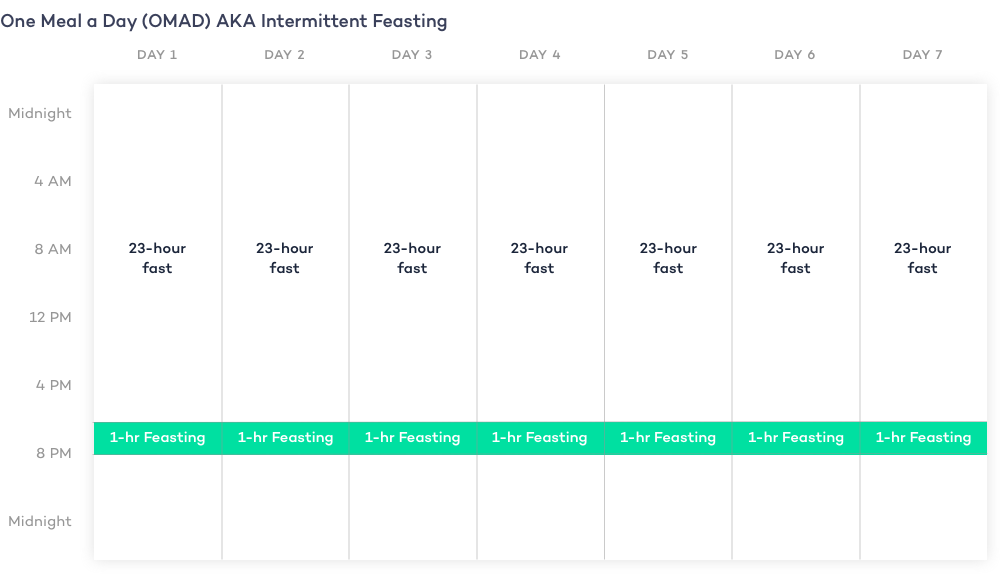
The 16/8 Intermittent Fasting Plan
This intermittent fasting plan skipping breakfast and eating within an 8 hour period, such as 12-8 p.m. Between the eating window, you fast for 16 hours.
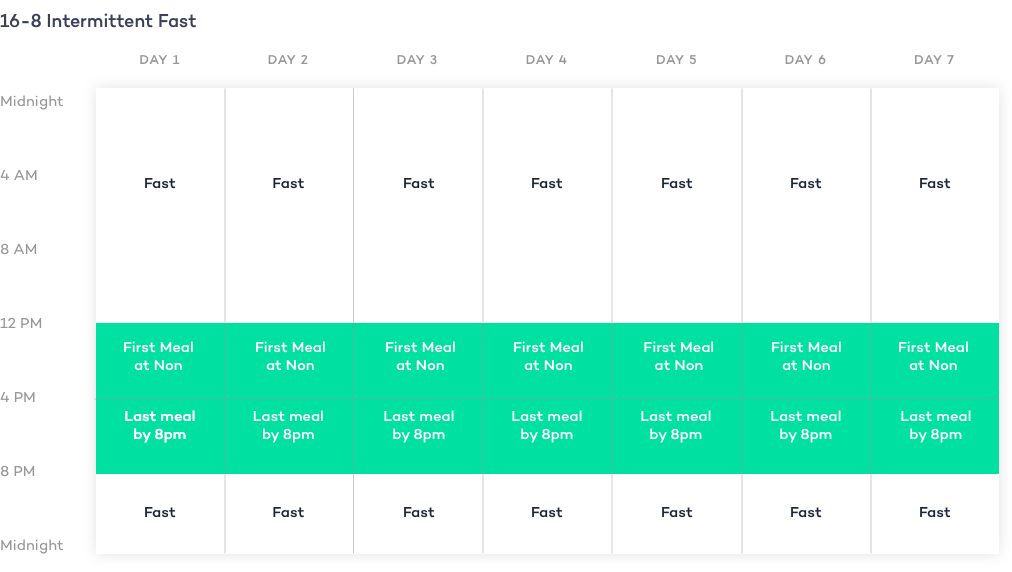
Eat-Stop-Eat Intermittent Fasting Plan
This simple intermittent fasting plan entails not eating for 24 hours once or twice a week.
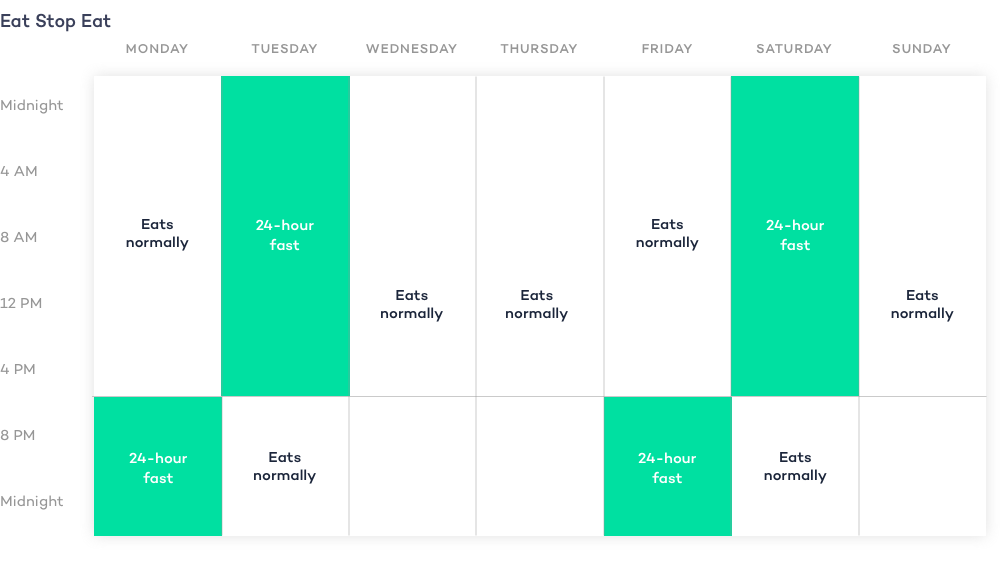
Circadian Rhythm Fasting Plan
Circadian Rhythm Fasting involves eating during the daylight hours when digestion and metabolism are most active. And fasting after 7 pm when metabolism naturally slows down.
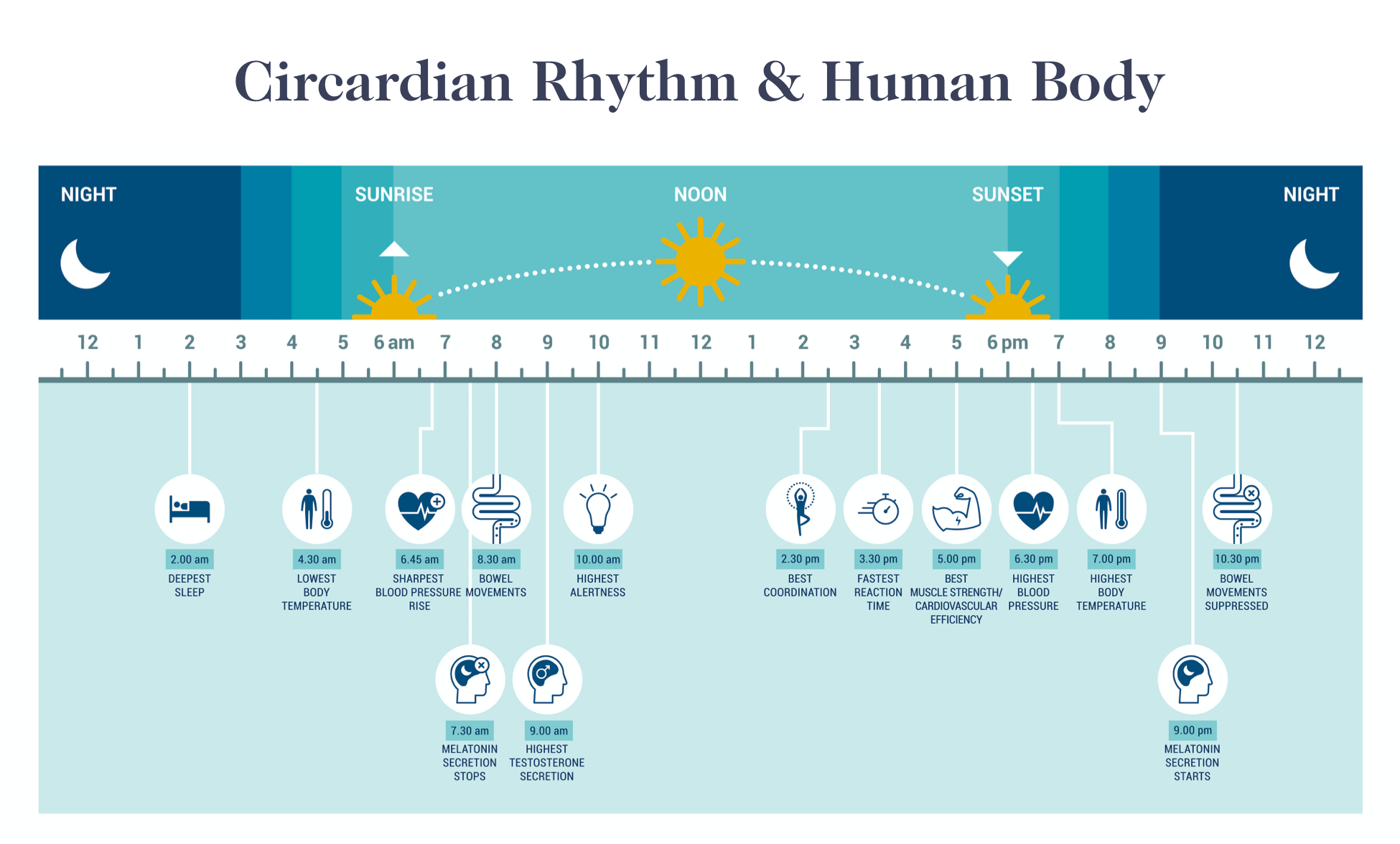
Brunch Fast (AKA 12-14 Hour Fast) Plan
This fast entails 12-14 hours of fasting ending with a late breakfast, or brunch. To be honest, we’re not exactly sure how some people consider this fasting.
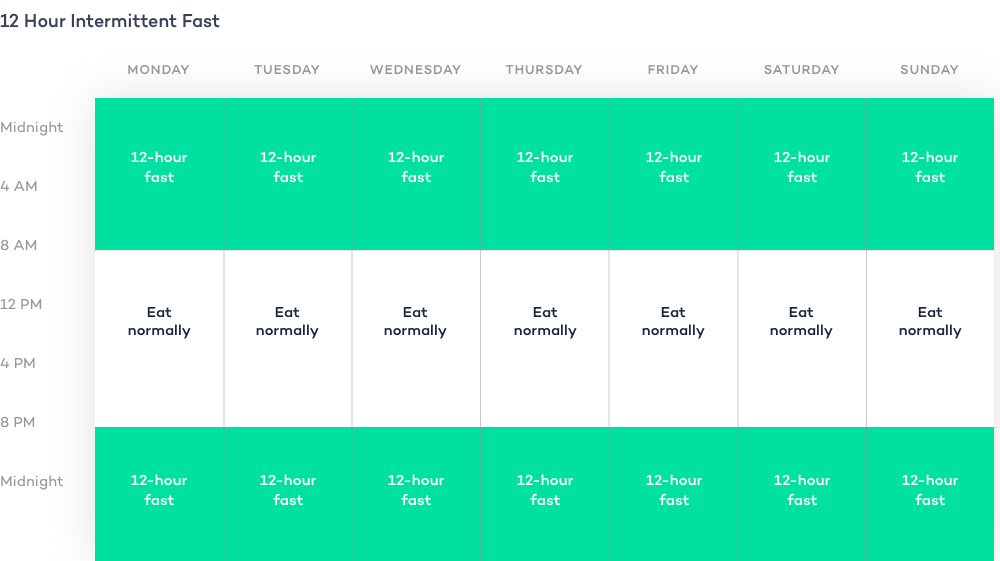
Top 10 Benefits of Intermittent Fasting
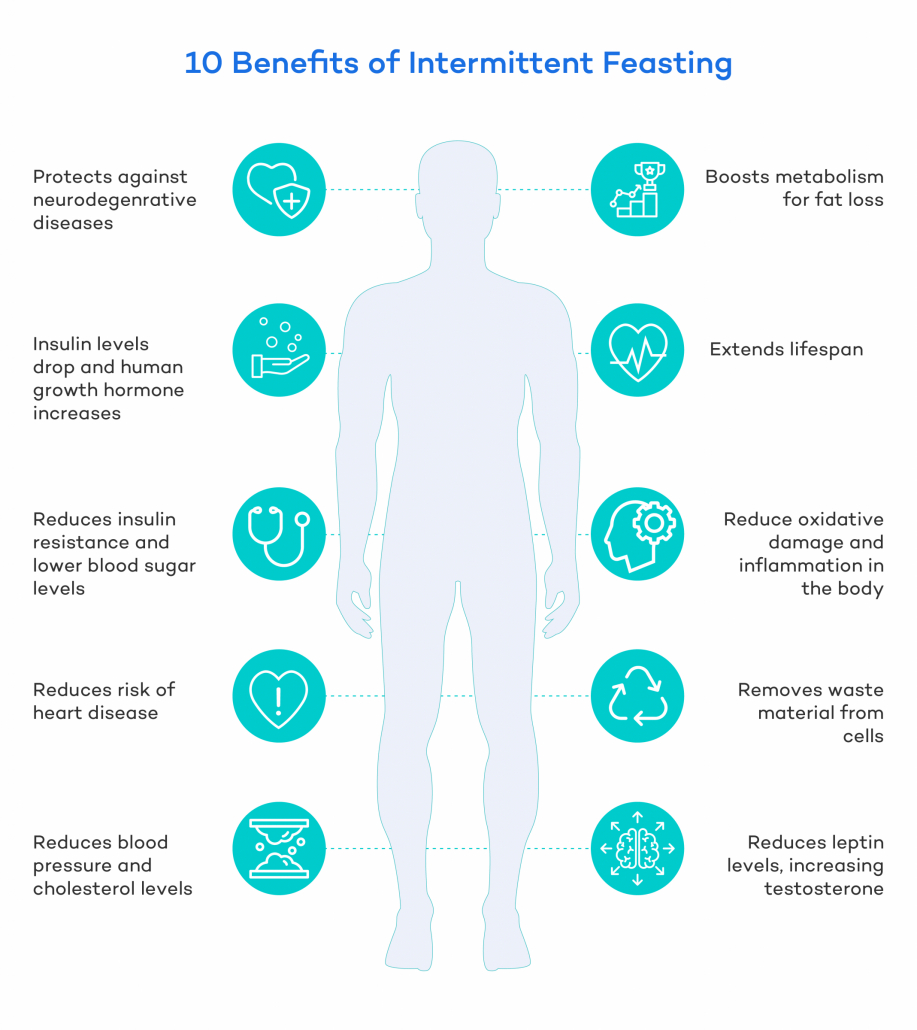
Now that you know what IF is, and how to do it, let’s take a closer look at the possible intermittent fasting benefits.
1.Supports Fat-Burning and Weight Loss
Intermittent fasting has been shown to benefit weight loss, by increasing fat burning.
How does it work?
When you eat, the carbohydrates in your food get broken down into glucose (blood sugar). But when you stop eating and enter a “fasted state”, your body has to look for different sources of energy.
The first place it turns is the sugar (glycogen) stored in your muscles and liver. But our bodies only have a small amount of stored glycogen–1 or 2 days worth, max.
After glycogen, your body begins breaking down stored fat into energy molecules. These molecules are called ketones, replace glucose as the main fuel for your cells.
The more you practice IF the more insulin sensitive you become. When insulin is low your body is better at burning fat.
Studies show that due to these hormonal changes fasting can increase your metabolic rate by 3.6–14%.
A 2012 study published in Cell, looking at the effects of timed eating on cell metabolism found that intermittent fasting was so effective that it has the potential to curb the obesity epidemic.
And a specific type of intermittent fasting known as Circadian Rhythm Fasting, has been shown to optimize the time you eat for cell metabolism, further supporting a healthy weight.
And yet another study found that intermittent fasting results in less muscle loss than standard calorie-restricting diets.
2. Improves Insulin Sensitivity
When you eat carbs your blood sugar rises. To get that sugar out of your blood and into your cells, your body produces the hormone called insulin.
When you eat a chronically high amount of carbs, like most people on a Standard American Diet, you’re producing chronically high levels of insulin. Eventually, your cells stop responding– you’ve got insulin resistance.
With insulin resistance, your blood sugar stays toxically high and can lead to numerous hormonal and inflammatory diseases and disorders like PCOS, heart disease, and diabetes.
One of the key intermittent fasting benefits is its ability to help your body properly use the glucose in your blood, allowing your body to produce less insulin. With less insulin in your blood, your cells become more sensitive (responsive) to it. Studies show that reduced insulin can even have positive effects on memory.
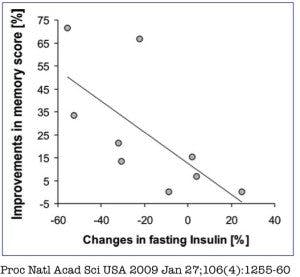
3. Supports Cellular Renewal and Repair
Like the mythic figure of the phoenix, when it comes to our cells, death and rebirth is a positive cycle. And IF supports it.
Research has shown that fasting can support your body in breaking down and destroying damaged and abnormal cells, and recycling them for energy. It’s a process called autophagy.
Think of it like cellular “spring cleaning.” Autophagy has many benefits including cellular repair and regeneration, reductions in abnormal cell growth, and maintenance of healthy tissues.
4. Increases Stem cell Production
When intermittent fasting you allow your body to enter a mode of cellular repair. Since stem cells are the primary repair system in your body, when you fast, they increase.
It works like this: A fasted body reduces energy use by rapidly shrinking organs, tissues, and different cells in your blood, including a dramatic 28% decrease in white blood cells. This lack of blood cells sends the body into repair mode, stimulating stem cell growth.
Studies show that fasting can increase stem cells in the muscles, intestines, and brain while supporting the body’s ability to regenerate stem cells even when not in a fasted state.
In an MIT study looking at the effects of IF lead researcher, David Sabatini concluded, “This study provided evidence that fasting induces a metabolic switch in the intestinal stem cells, from utilizing carbohydrates to burning fat,” Sabatini says. “Interestingly, switching these cells to fatty acid oxidation enhanced their function significantly.”
5. Boosts Human Growth Hormone
A recent study looking at the effects of IF on 200 people found that fasting for just a twenty-four-hour period increased HGH by 1300% in women, and 2000% for men.
This is significant because HGH is essential for building, maintaining, and repairing healthy tissue in the brain, bones, and other organs. It also speeds up injury healing and muscle repair, boosts metabolism, increases muscle mass, and helps burn fat.
6. Increases BDNF, “Miracle-Gro for your brain”
BDNF stands for Brain-Derived Neurotrophic Factor. This naturally occurring growth hormone is responsible for the creation of new neurons.
These qualities are why Harvard Neuropsychiatrist, John J. Ratey crowned it, “Miracle-Gro for the brain.”
The intermittent fasting benefits of increased BDNF include better moods, improved cognitive ability, higher productivity, and improved memory. BDNF can also reduce the risks of neurodegenerative diseases like dementia, Alzheimer’s, and Parkinson’s.
The exact reason why intermittent fasting boosts BDNF isn’t clear. Some researchers believe it is due to the role of BDNF in the rapid formation of neural networks.
New neural networks form when nerve cells in the brain fire together, creating a new thought, skill, or memory. In emergencies, we form these networks very quickly.
The body may respond to Intermittent fasting as a mild emergency that creates a healthy dose of stress, priming the mind to be able to make new neural networks.
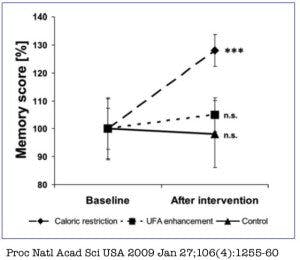
7. Reduces Inflammation
Chronic inflammation is the root cause of the deadliest disease across the globe, and fasting can help.
Fasting can reduce inflammatory activities and reduce chronic inflammation. This gives IF the power to improve nearly every marker of physical and mental health while reducing the risk of disease.
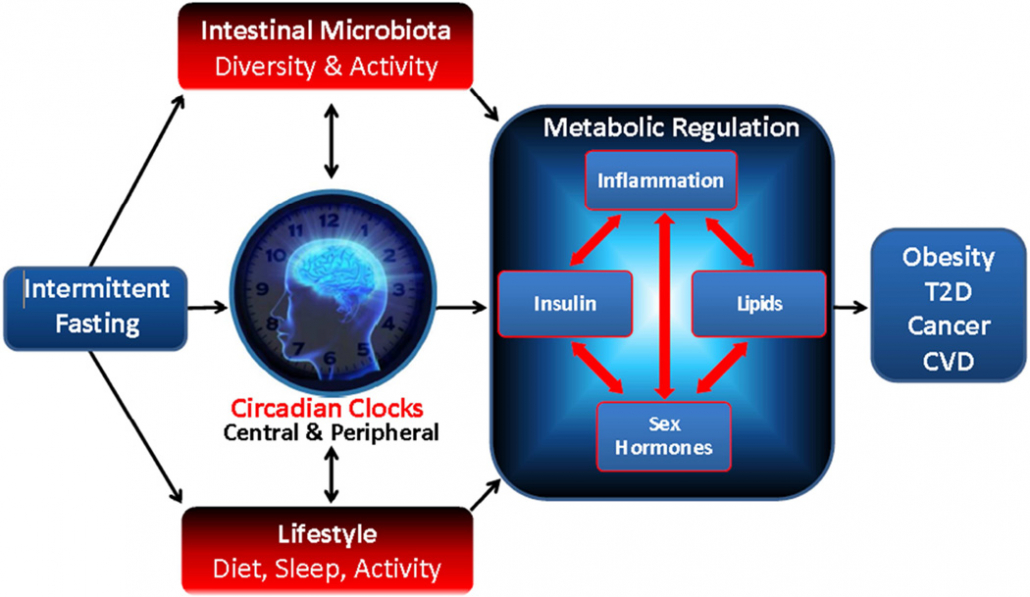
Association of intermittent fasting with intestinal microbiota, circadian clock, and other lifestyle factors hypothesized to result in metabolic regulation and downstream impacts on obesity, type 2 diabetes (T2D), cancer, and cardiovascular disease (CVD).
8. Improves Energy and May Improve Longevity
The intermittent fasting benefit of switching your body into using fat by turning them into free fatty acids and ketones can increase your energy levels.
The way it works is that ketones support a process called mitophagy. Mitophagy is the breaking down of old, damaged, and dysfunctional mitochondria–the energy factories of each cell–and replacing them with new mitochondria.
Researchers point to this process as one of the reasons why in studies, intermittent fasting can extend the lifespan of rats by 36–83%. Though promising, more research needs to be done to confirm similar effects in humans
Fasting also saves your body the energy it would be using for digestion. In studies we see that this extra energy can boost stem cells that regenerate intestinal lining, helping heal leaky gut syndrome.
9. Reduces food Addiction and Supports Mindful Eating
Modern life is plagued with mindless snacking, emotional eating, craving, and binging processed junk food.
Intermittent fasting helps us break the habit of relying on food as an emotional crutch.
A 2020 study in the Journal of Addiction Research looking at the effects of intermittent fasting on food addiction found that “most if not all organ systems respond to intermittent fasting in ways that enable the organism to tolerate or overcome” food addiction, and then return to normal.
The study also notes that after a fasted period, the type of food you eat is important to maintaining a non-addictive relationship to food. These satiating superfoods can help!
And if you’re looking for more support with food addiction, you can learn more about mindful eating here.
10. Treatment and Prevention of Cancer
Though the research supporting intermittent fasting as effective in treating and preventing cancer is just emerging, much of it is very positive.
A 2019 study published in the National Review of Cancer found that “Fasting or fasting-mimicking diets (FMDs) lead to wide alterations in growth factors and in metabolite levels, generating environments that can reduce the capability of cancer cells to adapt and survive and thus improving the effects of cancer therapies.”
Another 2019 study found that intermittent fasting increased the effectiveness of chemotherapy against cancer cells while protecting healthy cells.
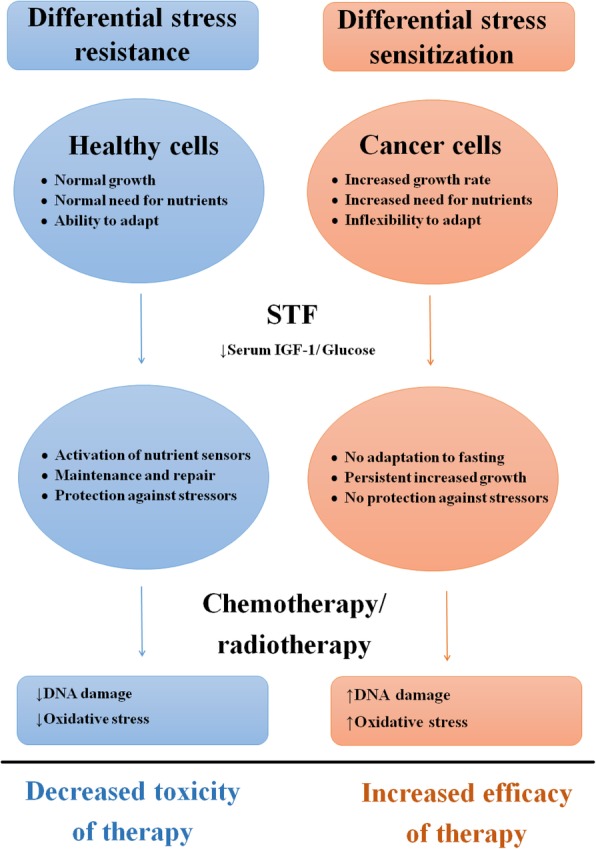
Image from ncbi.nlm.nih.gov
Intermittent Fasting Tips and Things to Watch out For
The following intermittent fasting tips are here to keep you healthy and thriving. For people who eat a lot of processed foods and have carb-addicted bodies, you will want to augment your intermittent fasting plan with other dietary changes to make sure you’re properly fueling your body.
Mediterranean keto, and standard ketogenic diets are a great place to start.
Ancestral But Not for Everybody
Though IF is likely an ancestral eating pattern, this does not necessarily mean it is the best dietary option for everyone. As with any dietary change, it’s important to look at both the pros and the cons of intermittent fasting.
Recent research is showing that the pros of IF may depend on how long you practice it. And the outcomes are certainly influenced by the quality and quantity of food you eat while practicing IF.
Let’s take a closer look at the things to watch out for.
Increased Stress Hormones
The most persistent concern about intermittent fasting is the idea of incurring a stress debt, and a cascade of possible negative effects associated with prolonged stress.
Intermittent fasting that entails long periods between meals can put stress on the body due to the fact that 20% of our brain cells require glucose, (blood sugar). They cannot be fueled by the ketones produced when the fasted body breaks down fatty acids. That said, your body can produce all the glucose it needs from protein in a process called gluconeogenesis.
However, consistently depleted blood sugar triggers the body to release the stress hormones glucagon, human growth hormone, epinephrine, and cortisol .
In the short term, any negative consequences of these stress hormones are likely outweighed by the benefits of IF for gut health, insulin resistance, and reduced inflammation. But in the long term, these stress hormones can lead to negative metabolic changes.
Fasting Hyperglycemia
Though short-term intermittent fasting has been shown to increase insulin sensitivity, this may not be true in the long term.
The consistent release of stress hormones puts the body in a state where it anticipates deprivation. In response, the body increases insulin resistance, while at the same time increasing gluconeogenesis (the synthesizing of glucose from protein), leading to a state of elevated blood sugar called “fasting hyperglycemia.
This process is aimed at conserving energy and storing it as fat to endure future deprivation.
Muscle Wasting
Another result of metabolic stress can be muscle wasting.
A 2020 study comparing intermittent fasting to a standard diet of 3 meals a day with snacks in between for 12 weeks, revealed that IF dieters lost significantly more lean mass than fat mass compared with no IF participants.
Interestingly, the lead researcher of the study, a UCSF cardiologist who had been practicing IF himself for 6 years while recommending it to his patients, was compelled to quit fasting himself.
Though IF had worked for him, the negative data from the study made him reconsider it as a factor in his health. His conclusion: “Almost anything can work if you start paying attention to what you’re eating and being more thoughtful and careful.”
Refueling Risks
Fasting induces controlled atrophy and cell death, which can lead to cellular regeneration and renewal. But it’s crucial to feed these growing cells with quality food.
Beware that eating processed foods high in carbs and added sugars at the end of a fast can increase cancerous activities and cause pre-cancerous lesions especially in the liver and intestines.
Who Should Avoid Intermittent Fasting?
Like any diet and lifestyle change, intermittent fasting is not a great fit for everyone.
If you’re pregnant, or breastfeeding, have an eating disorder, or low body weight, it’s best not to practice intermittent fasting.
Even for people with no pre-existing conditions, IF is often a radical change in metabolism. This can have strong effects on mood and energy.
It’s important to be mindful of the changes taking place within you, and seek professional advice if things don’t feel right. There is also emerging evidence that IF may be most beneficial in the short term, and may have some negative effects in the long term–more on these below.
Is Intermittent Fasting Safe for Women?
Though intermittent fasting can benefit both sexes, studies show that it can have different effects on men and women.
Men generally do better on IF than women, and there are certain aspects that women need to be careful about. To learn more see our article on IF for women here
These differences are likely a result of male and female hormones. The female body is more sensitive to calorie restriction than the male body. Restricting calories affects the hypothalamus along with gonadotropin-releasing hormones (GnRH).
GnRH controls the release of two important reproductive hormones, the luteinizing hormone (LH) and the follicle-stimulating hormone (FSH).
When these hormones are disrupted it can lead to a number of hormonal issues like reduced ovary size, irregular periods, amenorrhea, infertility, and a decrease in bone density.
Women can decrease the likelihood of adverse effects by following a more gentle method like crescendo fasting. And by combining IF with a keto (high-fat low-carb) diet. A keto diet can protect women against hypoglycemic stress and reproductive hormone imbalances.
Intermittent Fasting: The Outlook
Intermittent fasting, or as we like to say “intermittent feasting,” is an emerging diet trend with roots in ancestral eating patterns.
There are numerous intermittent fasting plans, and preliminary research shows that if practiced correctly, they may offer powerful health benefits, especially for gut health and when undergoing cancer treatment.
It should be noted that the benefits of intermittent fasting have been researched mostly in short-term trials. There is emerging evidence that the long-term practice of IF may have some downsides to be aware of. However, anecdotal evidence tells us that there are tens of thousands of people who have been practicing long-term IF with zero downsides. The key to a safe and effective IF practice is listening to your body.
When weighing the pros and cons of intermittent fasting, it appears that short-term intermittent fasting is probably a net positive for most people. And it can be a powerful way to develop mindfulness and around eating patterns leading to healthier diet and lifestyle choices.

















